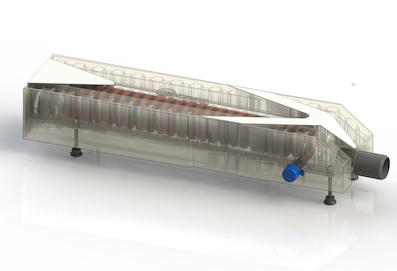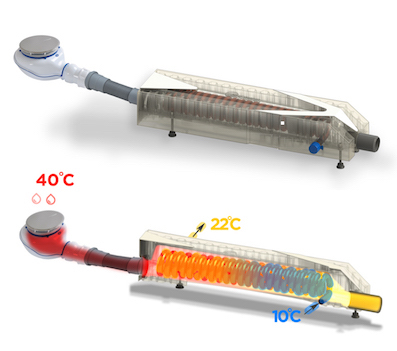KBzine: the original kitchen and bathroom industry e-news - since 2002
22nd December 2020
We strongly recommend viewing KBzine full size in your web browser. Click our masthead above to visit our website version.
How to make your bathroom an eco-friendly zone
 By André Fonseca, Zypho
By André Fonseca, Zypho
"As consumers and homeowners we very aware of environmental concerns, particularly in relation to plastics and energy usage. However, we need to address environmental concerns on many fronts. There is overuse of everything, from water to fossil fuels, from packaging to fashion items and action is needed to tackle all of this.
Fortunately, all this attention is changing buying habits. According to a recent survey from Accenture, over 80% of people felt it was "important or extremely important" for companies to design environmentally-conscious products.
Additionally, 72% of people reported actively buying more environmentally-friendly products than they did five years ago, while 81% said they expected to buy even more over the next five years.
Unfortunately, many of the systems we have in place were designed in times of plenty when environmentalism wasn't as great a concern. This means that many household products are pretty wasteful.
Take the toilet, for example. A single flush can use up to six litres of water (older models using far more). Since the average person flushes five times per day, that's around 30 litres of water going down the toilet.
How can we reduce our water usage and what else can we do to make our bathrooms more eco-friendly?
Switching to low-flow fixtures
Back in the early days of environmentalism, people became more conscious of their water usage. Supplies of freshwater that have not been polluted are drying up, so it's a resource we need to protect. Because of this, people started installing more water-efficient toilet flushes and turning off their taps when cleaning their teeth.
However, it's now possible to take water saving even further with low-flow fixtures in our bathrooms. Highly-efficient showerheads, toilets and faucets all drastically reduce the amount of water being used without really affecting the quality of the shower/flush/flow. One example is the dual-flush toilet. These have two flush methods, helping to reduce the average water consumption per flush to four litres or less.
Another, more recent, example is the Nebia Spa Shower, which uses 10 precision nozzles to atomise the water. Not only does this leave you feeling just as clean as a regular shower, it saves up to 65% of the water!
Recapturing your heat energy
 These days, many of us enjoy the convenience of a power shower. There's no need to pre-heat the water and there's no running out after every couple of showers. But, if you have a Smart meter installed, you'll know how much energy power showers use. They're one of the biggest energy drains in the entire house!
These days, many of us enjoy the convenience of a power shower. There's no need to pre-heat the water and there's no running out after every couple of showers. But, if you have a Smart meter installed, you'll know how much energy power showers use. They're one of the biggest energy drains in the entire house!
Have you ever considered, however, that a lot of that heat energy is simply disappearing down the drain? In fact, in a power shower heated to 40 degrees Celsius, the water going down the drain is still around 38 degrees.
Zypho has created an innovative recovery/ recapture system that can be retrofitted into existing showers to recapture that heat. All that 38-degree water is used to pre-heat the fresh mains water going up to the shower, helping to save up to 67% of the energy cost of heating a shower. It's a very simple yet effective way to recapture energy!
Recyclable fitting and using recycled materials
A bathroom contains some of the largest items in your home and most are non-recyclable.
Take baths. They're often mad of fibreglass or acrylic. Both materials are difficult to recycle. A main reason for this is their durability and longevity, which is a good eco-credential to have.
 However, German manufacturer Kaldewei has created bathtubs made from steel enamel. Every tub comes with 30-year guarantee, giving it the same longevity as traditional bathtub materials. However, instead of ending up in a landfill at the end of their lifespan, these steel bathtubs can be completely recycled, along with their steel fittings.
However, German manufacturer Kaldewei has created bathtubs made from steel enamel. Every tub comes with 30-year guarantee, giving it the same longevity as traditional bathtub materials. However, instead of ending up in a landfill at the end of their lifespan, these steel bathtubs can be completely recycled, along with their steel fittings.
Another material to consider is recycled tiles. Tiles are commonly used in bathrooms as they are relatively watertight, resist the growth of bacteria and mould, and are easily wiped clean.
Most tiles, however, are created from virgin materials, using vast amounts of natural resources. Bedrock Industries creates bathroom tiles from recycled content. Not only does this save other materials from going to landfill but the tiles can also be made into almost any style you can imagine.
Using different cleaning products
The bathroom is an area of the house most people want to be exceptionally clean. You want to feel clean coming out of the bath or shower, yet it's a room where we take care of our dirtiest bodily functions. As such, most people opt for strong, intensive cleaning products.
Ammonia or bleach-based products are a favourite. They have great antibacterial and antifungal properties, yet are particularly bad for the environment and can be toxic.
A simple alternative may be to make your own cleaners from natural products such as white vinegar and lemon. Not only does this combo cut through grease and oil very well, but it is also very gentle to the environment.
If you're not a fan of the strong vinegar smell or just don't have the time or inclination to mix your own cleaning products, you could opt for an environmentally-friendly cleaning brand.
Seventh Generation offers eco-friendly cleaning products for the entire house, from washing up liquid to floor cleaner to bathroom sprays. All of their products are made from natural, non-toxic ingredients with essential oils used for fragrance.
Another, more widely available option, is ECover. The company is B-Corp certified, demonstrating that it has a commitment to social and environmental good. Its bathroom cleaner is particularly good for those living in hard water areas or who have a build-up of bathroom scum.
What I particularly love about ECover is that even its packaging is biodegradable, being made from sugarcane! Ethical, environmentally-friendly and completely biodegradable. What's not to love?!
Moving home often means refurbishing a bathroom so why not take the opportunity to make your new bathroom as eco-friendly as you can?
Ed: "and if you're a retailer, these tips are definitely worth sharing with your customers"
André Fonseca is the CEO of Zypho, a company developing internationally-patented shower-drain heat recovery solutions for domestic and commercial showers.
Citations:
www.businessnewsdaily.com
www.home-water-works.org
www.nebia.com
www.kaldewei.co.uk
www.bedrockindustries.com
www.global.seventhgeneration.com
www.www.ecoverdirect.com
11th February 2020








